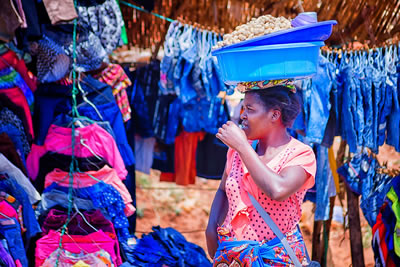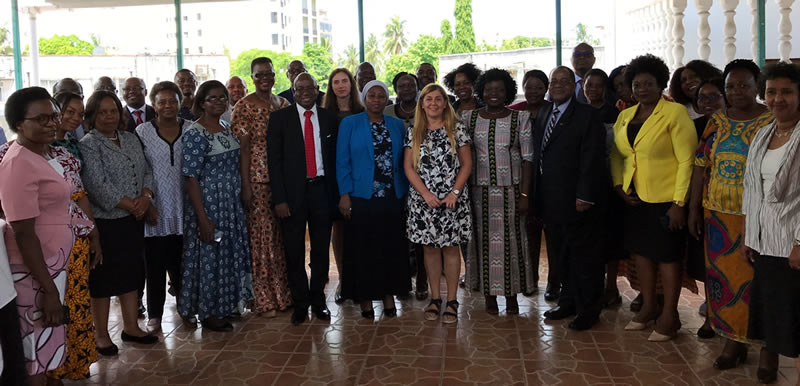African women engaging in informal and small-scale cross-border trade stand to benefit from policy suggestions emanating from UNCTAD's Borderline project.
African borders are often porous with a significant volume of informal trade being done outside formal crossings.
Informal trade can be very beneficial to those living near borders as it provides livelihoods and contributes to job creation and ensuring food security through the trade of agricultural products. But it comes at a cost for African governments.
And crossing borders through informal path can be a perilous journey for some, especially women who do most of the informal cross-border trade, yet who face many more hurdles to doing business with their neighbors.
These women often do not see the formal trade as a viable option, mainly due to a lack of information on how to conduct formal business.
These set of challenges were analyzed as part of UNCTAD’s Borderline project, which focuses on the cross-border trade experiences of three east African countries: Malawi, Tanzania and Zambia.
- UN Development Account Project: Informal cross-border trade for empowerment of women, economic development and regional integration in Eastern and Southern Africa
The result is a fresh set of turnkey policy recommendations with gender firmly at their centre. The recommendations aim to help smooth the kinks and ensure women benefit more wholly from cross-border trade and embrace the many benefits of formalization.
“Policy is the first step toward addressing challenges, and now that we understand the problem more deeply, there is something we can do about it,” said Simonetta Zarrilli, the head of UNCTAD’s trade, gender and development programme.
UNCTAD discussed the recommendations with 41 policymakers and civil society representatives from Malawi, Tanzania and Zambia at the project’s final regional workshop in Dar es Salaam, Tanzania on 4 and 5 December.
The recommendations were welcomed by those at the workshop.
“It is really important that governments engage in implementing the recommendations of the Borderline project, to achieve inclusive economic development,” said Benson Keith Chali, the Zambian high commissioner to the United Republic of Tanzania.
Representatives of traders and women associations shared this view.
“UNCTAD’s recommendations will go a long way in helping small scale cross-border traders to grow their businesses,” said Esther Chukambiri, chairperson of the Malawi Association of Cross-Border Traders (CBTA).
The power of policy
Despite their critical role in small-scale cross-border trade, women often benefit only marginally from their trading activity. This is due to several factors, including policy, institutional, cultural, economic, and regulatory issues.
They also lack access to information about customs procedures, are unfamiliar with trade regimes, do not have access to decent finance and have limited entrepreneurial skills.
“Customs policies and procedures are not fully understood by women traders. Customs administration officers, however, take for granted that everybody knows the rules,” Tanzania’s health, community development, gender, elderly and children minister, Ummy Mwalimu said at the workshop.
UNCTAD’s policy recommendations are captured in an advocacy document which suggests eight key areas of intervention to address the challenges:
Training and awareness raising on trade issues
Simplified trade regimes and their uptake
Transparency and sensitization
Enabling business environment and formalization
Improved dialogue among stakeholders
Access to finance and infrastructure development
Policy coordination
Involving women’s organizations
The workshop allowed participants to discuss concrete next steps to make cross-border trade a profitable and sustainable activity for traders, especially women, and a tool for economic development and enhanced regional integration.
Participants highlighted the need to have a broad policy framework to include actions in the area of public health and HIV/AIDS prevention.
“Interventions should include health policies as this is a cross-cutting issue. A healthy trader is a productive trader,” said Christine Phiri Sikombe, CBTA Zambia’s secretary-general.
The same applies to the inclusion of the education, for interventions aimed to raise awareness.
“Low literacy rates among traders constitute a major problem,” said Robert Dufter Salama, Malawi’s permanent representative to the United Nations in Geneva.
Literacy is a challenge the Borderline project tackled from the outset.
“Low literacy level is something any awareness and capacity-building activity for small and informal cross-border traders, especially women, should take into account,” added Ms. Zarrilli.
Participants were also in favor of decentralizing the actions and engaging local governments in policy implementation.
Representatives of the East African Community (EAC) and the Common Market for Eastern and Southern Africa (COMESA) secretariats shared also their recent initiatives to promote simplified trade regimes (STRs).
COMESA, for example, is currently reviewing the list of products qualifying for STRs and is considering the inclusion of additional products. Raising the threshold of consignments from $2,000 to $3,000 is also under discussion.
Overall the Borderline project was lauded by participating organizations and governments.
In their concluding remarks, high-level speakers, including Ms. Mwalimu, expressed appreciation for UNCTAD’s work and for the main results achieved through the project.
“The project’s main findings and policy recommendations are truly relevant for our work,” added Grace Kwelepeta, Malawi’s deputy minister of gender, children, disability and social welfare.
The delivery of the recommendations closes out the Borderline project, which was funded through the UN Development Account.


